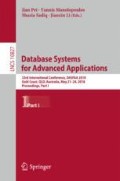Abstract
Directionality is a significant property of social networks, which enables us to improve our analytical tasks and have a deeper understanding about social networks. Unfortunately, the potential directionality is hidden in undirected social networks. The previous studies on recovering directionality in undirected social networks mostly focus on the microscopic patterns discovered in the existing directed social networks. In this paper, we attempt to recover the directionality based on the macroscopic community structure. To this end, a variant of the existing modularity model, called behavioural modularity, is designed for discovering community membership of nodes. Assuming that members in the same community have higher behavioural similarity, we introduce the concept of the intra-community popularity, and then estimate directionality of undirected ties based on the community structure and the intra-community popularity. Accordingly, we propose a novel Community and Popularity based Direction Recovering (CPDR) approach to recover the directionality of undirected social networks. Experimental results conducted on three real-world social networks have confirmed the effectiveness of the proposed approach on direction recovery.
Access this chapter
Tax calculation will be finalised at checkout
Purchases are for personal use only
Notes
- 1.
The Python code and the benchmark datasets are available at https://www.dropbox.com/sh/dhvhosmzxko0jk2/AACMzPhrm0XdrYZSHI6db_Cda?dl=0 (Extracting Password: DASFAA2018).
- 2.
- 3.
- 4.
References
Yin, H., Benson, A.R., Leskovec, J., Gleich, D.F.: Local higher-order graph clustering. In: KDD, pp. 555–564 (2017)
Ripeanu, M., Foster, I.T., Iamnitchi, A.: Mapping the Gnutella network: properties of large-scale peer-to-peer systems and implications for system design. CoRR cs.DC/0209028 (2002)
Leskovec, J., Huttenlocher, D., Kleinberg, J.: Predicting positive and negative links in online social networks. In: WWW, pp. 641–650 (2010)
Leskovec, J., Huttenlocher, D., Kleinberg, J.: Signed networks in social media. In: Proceedings of the SIGCHI Conference on Human Factors in Computing Systems, pp. 1361–1370 (2010)
Liben-Nowell, D., Kleinberg, J.: The link-prediction problem for social networks. J. Assoc. Inf. Sci. Technol. 58(7), 1019–1031 (2007)
Liu, L., Xu, L., Wangy, Z., Chen, E.: Community detection based on structure and content: a content propagation perspective. In: ICDM, pp. 271–280 (2015)
Leicht, E.A., Newman, M.E.: Community structure in directed networks. Phys. Rev. Lett. 100(11), 118703 (2008)
Ma, H., Zhou, T.C., Lyu, M.R., King, I.: Improving recommender systems by incorporating social contextual information. ACM Trans. Inf. Syst. 29(2), 9 (2011)
Zhang, J., Wang, C., Wang, J., Yu, J.X., Chen, J., Wang, C.: Inferring directions of undirected social ties. IEEE Trans. Knowl. Data Eng. 28(12), 3276–3292 (2016)
Peng, X.-R., Huang, L., Wang, C.-D.: A hybrid approach for recovering information propagational direction. In: Liu, D., Xie, S., Li, Y., Zhao, D., El-Alfy, E.-S.M. (eds.) ICONIP 2017. LNCS, vol. 10638, pp. 357–367. Springer, Cham (2017). https://doi.org/10.1007/978-3-319-70139-4_36
Newman, M.E.: Modularity and community structure in networks. Proc. Nat. Acad. Sci. 103(23), 8577–8582 (2006)
Yang, T., Jin, R., Chi, Y., Zhu, S.: Combining link and content for community detection: a discriminative approach. In: KDD, pp. 927–936. ACM (2009)
Acknowledgments
This work was supported by NSFC (61502543) and Tip-top Scientific and Technical Innovative Youth Talents of Guangdong special support program (2016TQ03X542).
Author information
Authors and Affiliations
Corresponding author
Editor information
Editors and Affiliations
Rights and permissions
Copyright information
© 2018 Springer International Publishing AG, part of Springer Nature
About this paper
Cite this paper
Wen, YM., Wang, CD., Lin, KY. (2018). Direction Recovery in Undirected Social Networks Based on Community Structure and Popularity. In: Pei, J., Manolopoulos, Y., Sadiq, S., Li, J. (eds) Database Systems for Advanced Applications. DASFAA 2018. Lecture Notes in Computer Science(), vol 10827. Springer, Cham. https://doi.org/10.1007/978-3-319-91452-7_34
Download citation
DOI: https://doi.org/10.1007/978-3-319-91452-7_34
Published:
Publisher Name: Springer, Cham
Print ISBN: 978-3-319-91451-0
Online ISBN: 978-3-319-91452-7
eBook Packages: Computer ScienceComputer Science (R0)

